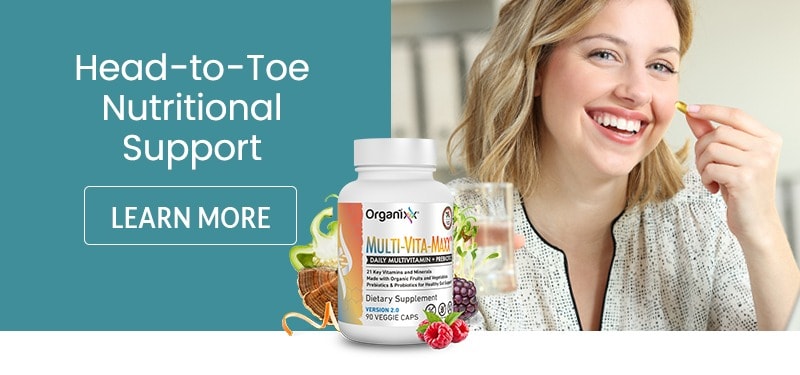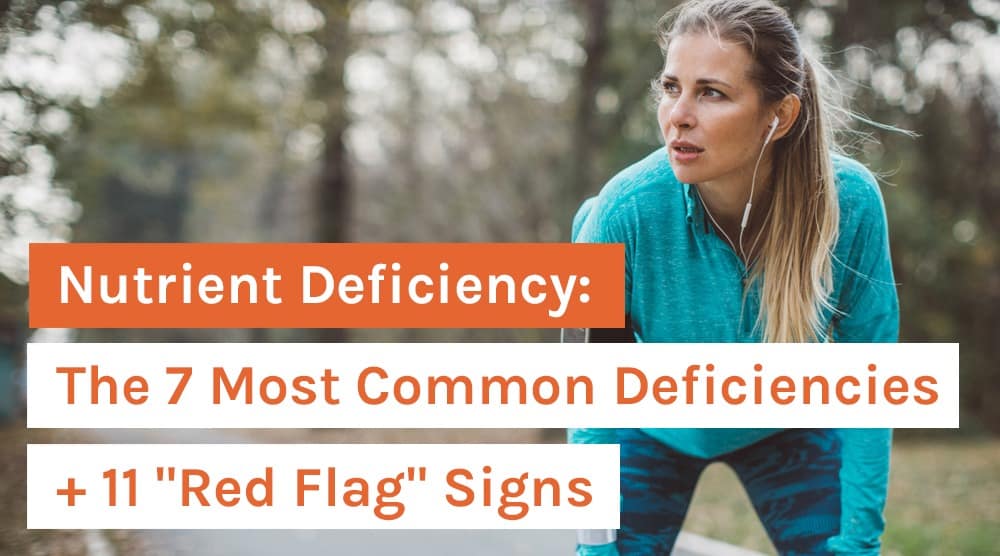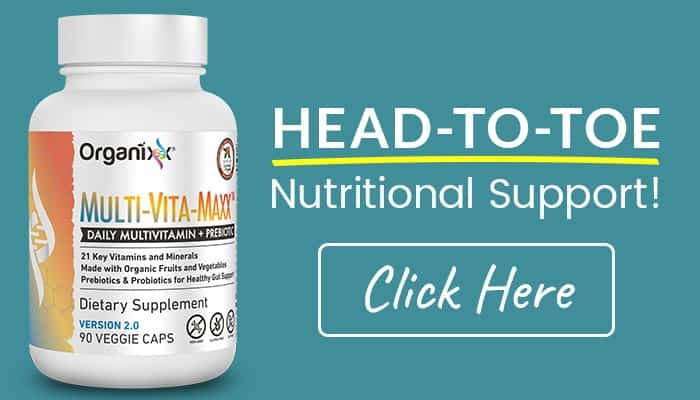Nutrient Deficiency: The 7 Most Common Deficiencies + 11 "Red Flag" Signs
In a hurry? Click here to read the Article Summary...
There was a time not too long ago when human beings were able to extract the majority (if not all) of the vital nutrients we needed for good health from the food we ate and our outdoor-focused, active lifestyles.
It is a sad fact that in these modern times, this is no longer the case. In fact, a 2006 study published in the Journal of the International Society of Sports Nutrition found that food alone doesn’t cut it when it comes to getting all the nutrients the body needs. Of the 70 healthy athletes analyzed by the study researchers, every one of them was deficient in at least three essential vitamins or minerals.
If top athletes (who are oftentimes obsessed with good nutrition) can become nutrient deficient… what does that say for the rest of us more than a decade later?
The 7 Most Common Nutrient Deficiencies in the World
Ironically, the nutrients we’re most deficient in are also some of the ones that are the most important for overall health. Here is a brief rundown of what they are and what they do:

#1 – Iron.
According to the World Health Organization (WHO), the most common nutrient deficiency in the world is iron deficiency as well as the number one cause of anemia in women and children.
Iron is a necessary component of hemoglobin in blood; this substance is what transports oxygen from the lungs via the circulatory system. On the other hand, studies have shown that too much iron may raise your risk of cancer and heart disease.
Experts recommend that individuals who think they may be iron deficient first consider getting a serum ferritin test. Recommended safe levels are usually between 40 and 60 ng/ml.
#2 – Vitamin E.
According to a 2009 report from the U.S. Department of Agriculture (USDA), a whopping 86% of the American population does not meet the U.S. recommended daily allowance (RDA) for vitamin E. [In perplexing contrast to this government data, diagnosed cases of vitamin E deficiency – i.e., α-tocopherol concentrations of less than 12 μmol/L (516 μg/dL) in adults – is rare.]
Vitamin E is a nutrient that is found in many foods, such as avocados, broccoli, and almonds. In the body, it acts as a powerful antioxidant and immune system booster. Vitamin E is also the “ambassador and translator” for cells, helping them to communicate effectively with one another.
#3 – Vitamin A.
Vitamin A is essential for healthy skin, teeth, bones, and vision. Most importantly, however, vitamin A helps to maintain the integrity of cellular membranes.
Beta-Carotene, the “pre-vitamin” for vitamin A, comes from fruits and vegetables as well as in quality multivitamins. In order for the conversion process from beta-Carotene to retinol (the absorbable form of vitamin A) to occur, a person needs a strong digestive tract and a healthy gallbladder.
According to data from the World Health Organization (WHO), vitamin A deficiency is the leading cause of blindness in children worldwide.
#4 – Vitamin D.
Vitamin D gets a lot of press these days linking it to breast cancer prevention. The American Association for Cancer Research (AACR) reported back in 2008 on a meta-analysis of four studies examining the link between vitamin D levels in the blood and breast cancer risk. One study found that sufficient levels of vitamin D led to a 80% reduction in breast cancer!
As reported by the AACR:
“An inverse association was observed between serum 25-hydroxyvitamin D [25(OH)D] levels and risk of female breast cancer in four recent observational studies. However, the exact 25(OH)D serum levels associated with a specific level of reduction in breast cancer incidence are still imprecise.”
Vitamin D, which is more of a hormone than a vitamin, is essential for health in other ways too – especially as a helper for other vitamins. For instance, vitamin D is intricately connected to the absorption of vitamin A, vitamin K, and calcium.
The current worldwide epidemic of vitamin D deficiency is caused in part by our modern work and lifestyle choices, which does not leave much time for enjoying the sun outdoors.
#5 – Magnesium.
The latest studies suggest that roughly 68% of all Americans are deficient in magnesium and up to 20% may suffer from severe deficiency.
The list of essential functions in the body that magnesium is responsible for is long. It includes:
- Nerve and muscle function
- Genetic synthesis
- Energy production and balancing
- Absorption of other key nutrients like iodine and vitamin C
- Hormonal health
- Sleep quality
- Protection from heavy metals like mercury and aluminum
Magnesium deficiency has been linked in studies to higher risk of cancer as well as cognitive breakdown and heart disease.
#6 – Vitamin C.
When you were a kid, you probably heard someone in your family say, “Come take your vitamin C!” whenever you had a cold. That advice wasn’t that far off. Vitamin C (ascorbic acid) is a necessary nutrient for immune system health. It is also important for the cardiovascular system since it is needed for the absorption of iron from food.
Vitamin C is also a powerful antioxidant which helps in the formation of collagen and wound healing. Surveys from the U.S. and Britain found that vitamin C deficiency occurs in 1 in 5 men and 1 in 9 women.
A 2004 report by the American Centers for Disease Control stated that vitamin C “may be the most important water-soluble antioxidant in human plasma” and that 13% of Americans are notably deficient in it.
Vitamin C must come from either food or supplementation; the body does not create vitamin C on its own.
#7 – Vitamin B12.
There are 8 B vitamins in all and all of them combined influence just about every single mechanism in the body. Getting enough vitamin B12 is especially important for the nervous system and brain health.
According to researchers at Tufts University, about 40% of adults have B12 levels below the normal range. Deficiency in this vital nutrient can lead to depression and other mental disorders, loss of the senses like taste and smell, cognitive decline, anemia, neuropathy in the hands and feet and cardiovascular issues.
Deficiencies in other B vitamins, such as B1, B2, and B6, are also quite common.
Why Are We So Deficient in Key Nutrients?
The body needs essential vitamins and minerals to complete the thousands of second-by-second functions it performs for health. Everything from maintaining good gut balance to keeping your heart pumping is reliant on the efficient break-down and use of nutrients.
“I eat a healthy diet,” you may be thinking, “so I have nothing to worry about, right?”
There was a time when this was true, but no longer. Even if you are someone who eats healthy, organic food every day, you can still have nutrient deficiencies.
First of all, because of poor soil, contaminants in the air and water, and an increasingly genetically modified food supply, the nutrient load of most produce is significantly less than it used to be.
A report published in 2004 by the University of Texas studied the nutritional value of 40 common fruits and vegetables grown in the U.S. between 1950 and 1999. What they found was shocking.
Over those 40 years, all of the foods they studied had “reliable declines” in key nutrients, including calcium, iron, vitamin C, and B vitamins.
The second reason has to do with malabsorption of nutrients within the body itself. Even if you are consuming great quantities of key essential nutrients, your body may not be able to absorb them properly in order to put them to work in your body.
The Most Common Causes of Nutrient Malabsorption
- Genetic dispositions (and environmental triggers that kick them into gear)
- Issues with methylation
- Issues with detoxification pathways
- Imbalances within the digestive tract itself
- A combination of these factors and others
All of these factors, including the expression of your genes, are influenced by one thing: lifestyle.
Diet, stress level, exercise level, hydration levels, and the quality of any supplements you are taking all play a part in malabsorption.
The last factor – gut imbalances largely caused by eating a SAD diet (standard American Diet) – are probably the most common reason why nutrient malabsorption occurs.
11 Signs You May Have a Nutrient Deficiency
 Nutritional deficiency tests, including blood, saliva, and urine tests, can be very beneficial in letting you know if you are low in a particular vitamin or mineral.
Nutritional deficiency tests, including blood, saliva, and urine tests, can be very beneficial in letting you know if you are low in a particular vitamin or mineral.
But before you ever send anything to the lab, sometimes you can determine if you have a dietary deficiency by watching for nutrient deficiency symptoms and signs in your own body.
Do You Have Any “Red Flags” for Nutrient Deficiencies?
According to functional nutritionist and best-selling author Dr. David Jockers as well as other experts, the following symptoms may be “red flags” for nutritional deficiencies:
- Hair loss
- Discoloration or ridges on nails
- Dark circles under the eyes
- Skin rash or acne that persists
- Periodontal disease
- Sores on the mouth
- Tingling or other sensations in the extremities
- Brain fog and other cognitive dysfunction, such as memory loss
- Loss of sexual drive/ libido
- Depression and/or lethargy
- Ongoing fatigue
If You Decide to Supplement, Choose Only the Best
Once you’ve determined you have a nutrient deficiency, the likely next step is supplementation. When deciding on a supplement manufacturer, be aware that many companies still use synthetic ingredients and chemical additives to keep costs (and quality) down.
In fact, it is estimated that up to 95% of all vitamin and mineral supplements out there are at least partially created using synthetic materials!
The happy news is that consumer demand is growing for quality products which utilize the very latest in natural health technology.
If you decide that supplementation in one or more key nutrients is right for you, be sure to do your homework. Choose a whole food brand that is organic and tests their products regularly for toxins including heavy metals and pesticides such as Organixx Multi-Vita-Maxx.
If you’re not getting all the nutrients and antioxidants you need from food, your best source is whole food vitamins. Organixx Multi-Vita-Maxx contains 21 uniquely fermented vitamins and enzyme-activated minerals that are more “bioavailable” and easily absorbed by your body than the synthetic compounds found in most supplements.

 Sources:
Sources:
Article Summary
7 most common nutrient deficiencies:
- Iron
- Vitamin E
- Vitamin A
- Vitamin D
- Magnesium
- Vitamin C
- Vitamin B12
Nutrient deficiency symptoms:
- hair loss
- discoloration or ridges on nails
- dark circles under the eyes
- skin rash or acne that persists
- periodontal disease
- sores on the mouth
- tingling or other sensations in the extremities
- brain fog and other cognitive dysfunction, such as memory loss
- loss of sexual drive/ libido
- depression and/or lethargy
- ongoing fatigue
Supplementation is a great way to combat nutrient deficiency but look for high-quality, whole-food-based supplements such as Organixx Multi-Vita-Maxx.






How does this work with medication I am taking for diabetes and high blood pressure
these vitamins are safe and there is no issue with blood pressure or daibeties medication
Sandra
There is a wonderful holistic Dr..he is on Facebook....you can watch his videos on there or You Tube.He is Dr Gregory Armstrong.He teaches people how to get off Diabetic Medicines and reverse your diabetes.just check him out....you willlove him...he is a wonderful man.
Sandra, I had type 2 diabetes, high blood pressure and a few other complaints, when I looked into natural remedies, I was not that confident when I started, but now all is fixed, real natural cinnamon for diabetes and olive leaf and beet greens for blood pressure. Try this, and when your doctor says you are OK, try the Multi-Vita-Maxx. If you ask while you still have the problems, your doctor will tell you to wait until your problems are gone, and this will never happen, and he/she knows it.
Sandra, always read leaflets that come with medications (especially your Metformin), & if there isn't one, ask the pharmacy for one. It's compulsory that they provide it.
Please I implore you research everything is on the Internet look at Mike Adams look at see your jeep green med info.com do your own investigation it’s not every doctor out there knows how to heal you they know how to give you a Band-Aid which are the pharmaceutical drugs look after yourself no one else is going to do it
I have the ridges in the fingernails. What deficiency does that indicate?
I have fibromyalgia and have been told by doctor who specializes in this that it is a common symptom of fibromyalgia. It may be a symptom of many other things as well including nutrition deficiencies.
This can be a sign of copper deficiency. An HTMA ( hair, tissue, mineral analysis) from Myers Detox can show you your status. Confirm deficient levels with blood testing, and then correct them with the guidance of a good functional medicine practitioner. Using this test, I was able to find out I had toxic levels of mercury and arsenic in my body. I detoxed for a year, and now feel so much better and was able to return to work. I was low in copper (had horrible nail ridges and soft nails) as well as many other minerals. My blood pressure and blood sugars have now returned to normal ranges.
How did you find out those deficiency on your body and what did you take to help your bidy i have similar symptoms but my dr say im ok in all my vitamins
I have noticed fine ridges on my nails that come and go.
I have nail vertical nail ridges; and break nails easily. What deficiency does this indicate?
I have vertical ridges on my nails. What food deficiency do I have?
Hi Martha, thanks for your question.
Discoloration or ridges on nails is a key indicator of a nutrient deficiency. We always suggest consulting with your trusted health care professional to help you determine what you're deficient in and what nutritional deficiency test would be your best option.
Nutritional deficiency tests such as blood, saliva, and urine tests can be very beneficial in letting you know if you are low in a particular vitamin or mineral.
Once you’ve determined you have a nutrient deficiency, the next likely step is supplementation. If you & your doctor decide that supplementation in one or more key nutrients is right for you, be sure to do your homework.
Choose a whole food brand that is organic and tests their products regularly for toxins including heavy metals and pesticides such as Organixx Multi-Vita-Maxx.
For more information on Organixx Multi-Vita-Maxx, we invite you to check out the following page where you will find, product details, ingredient label, customer reviews, and more: https://shop.organixx.com/collections/all-products/products/multi-vita-maxx
We hope this helps and wish you all the best on your health & wellness journey!
Iron and Copper
What can be done for tinnitus if anything??
melatonin 3 mg daily
I also have vertical nail ridges. I just listen to a podcast from Stephen Cabral. He says it's probably digestive issues. So I went out and bought some digestive enzymes to see if that helps.
Chris, I have nails like that also! I have been taking enzymes for about a year now for stomach issues but the ridges are still there. I have nerve and Arthritis body issues and I also read that ridged nails are one of the clues to that diagnoses.
With all due respect Sandra, type 2 diabetes and high blood pressure are caused by easily controllable environmental conditions within your body, and only 5% genetic. Please see a Naturopathic Doctor where you can completely reverse this..
Sandra,
We would suggest speaking with a trusted medical professional before starting any new supplements.
Hello. I am not sleeping well and my son tells me I may need to take HGH, human growth hormone. What can y'all tell me about taking HGH and sleep ?
Read Dr. David Brownstein’s book on natural hormones. It explains ALL the hormones, including HGH! He explains that in his years of practice with natural hormones, he never prescribed just one hormone. Best results are with a combination and should have tests done and be monitored by a doctor who uses natural hormones from a compounding pharmacy. Also diet and key supplements are also used. Can check your library for this book!!
Take Arginine and Lysine - these two together can increase HGH significantly.
I've read about certain individuals taking 1200mg of Arginine and 1200mg of Lysine which have helped the production of HGH by up to 695% during sleep. In otherwords, take these two amino acids before bed.
For sleep ...you are probably magnesium deficient and beef up your B-6. Chelated or Pico magnesium for maximum absorption.
I am speaking only about myself on this one. I had the same problem and stated taking Magnesium every night and it worked for me.
Hello a simple solution for this is drink sleepy time tea by selestrial.
Sound to easy it is I could not sleep I was getting sick. Then I came across this healthy tea.
No other band or tea works. I buy it foodland ir Coles or Woolworths
Julie
Celestial Seasonings is a brand I used to swear by, as well, and we also used many other varieties of their teas. That was, until I found out they have a lot of toxic chemicals in their tea bags and teas!! We do not touch that brand for ANYTHING, anymore!! I like some of the supplements that contain Melatonin, Valerian and other herbs. Although. for a small percentage of people, there can be difficulty with Valerian, but it works famously for me! There is also another wonderful supplement that will help you to relax better. It's called Theanine Serene with Relora. That stuff WORKS to calm you down, even during the day; but it you put it with a Melatonin sleep aid before bed, you will sleep amazingly well! :-)
Joyce S.
Certified Natural Health Professional since 2005
Raley's carries it too. My daughter says it helps her sleep.
More likely you are magnesium deficient. Choose a quality magnesium powder and take in the evening when your body best absorbs minerals. CALM is a good brand that I take.
I use to use Calm and my Doc told me to stop using it. All the ingredients is not so wholesome .
For sleep get some lavender essential oil or melatonin ..
Organic India sleepy tea is my favorite.
What do your doc say was not good about calm magnesium
Try a good magnesium supplement
Can’t tell you anything about hgh but can tell you that I haven’t slept well for 40 years. 2 weeks ago I started taking 250 mg of magnesium at bedtime and I sleep like a log. Makes mad that no doc ever suggested trying it.
I take a calcium/magnesium combo at bedtime and sleep like a baby. Vivid dreams, the whole shebang! Good luck to you Fritz and Suzette.
better take magnasium, calcium, zinc combo as zinc is also an essential omponant
I need to avoid folic acid. This says it has folic acid it. I assume this isn’t the synethic version? If so you should change it to say folate as you will lose many customers who wrongly assume it has folic acid which many avoid due to mthfr.
Kelly,
There are no synthetic ingredients or preservatives in this product. All ingredients are fermented or enzyme activated, fully bioavailable, non-synthetic from food sources. No ingredients are added to our products other than what is listed on the label. The Multi-Vita-Max formulation derives its folate from natural sources such as Red Lettuce, Green Lettuce, Spinach, Kale, Purple Cabbage, and Broccoli.
Then shouldn't your product label say "Folate" instead of Folic Acid? If I were looking to buy a product on line or over the counter and it stated "Folic Acid", I would IMMEDIATELY put it back and say to myself "Well, THAT ONE is garbage!" I think you would be better off it you stated "Folate" since that is what is in your product!!
Hi Joyce, thank you for your feedback.
Please know, there are no synthetic ingredients or preservatives in this product. All ingredients are fermented or enzyme activated, fully bioavailable, non-synthetic from food sources. No ingredients are added to our products other than what is listed on the label. The Multi-Vita-Max formulation derives its folate from natural sources such as Red Lettuce, Green Lettuce, Spinach, Kale, Purple Cabbage, and Broccoli.
You can view the full product label here:
https://cdn.shopify.com/s/files/1/1569/1827/products/MultiVitaMax-v2-2019-label-back_480x480.png?v=1576180300
We hope this helps and wish you a wonderful day!
I agree! It should say folate if it’s folate Folic acid is synthetic. So which one is yours?? If you continue to say folic then it’s synthetic.
Hi Fran, thank you for your question & interest.
We certainly understand where you're coming from. Rest assured, there are no synthetic ingredients or preservatives in this product or in any of our products. Only Folate is used in our Multi-Vita-Maxx supplement.
For more information on our Multi-Vita-Maxx supplement, feel free to check out the following links:
Product Page | Customer Reviews
https://shop.organixx.com/products/multi-vita-maxx
Product Details:
https://organixx.com/multi-vita-maxx/
FAQs
https://support.organixx.com/
We hope this helps and wish you a lovely day!